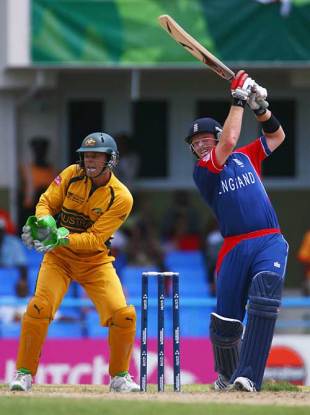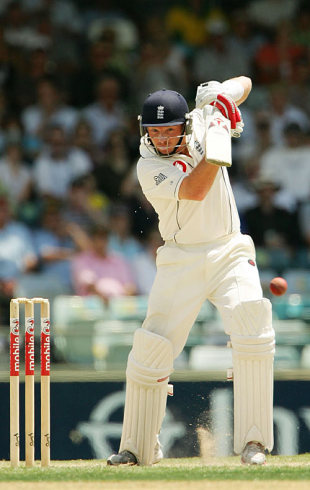Ian Bell

| |||
The words of Neal Abberley, a mentor since his formative years at Warwickshire, were still ringing in Ian Bell's ears when he went out to bat on the first day of the NatWest Series against India at the Rose Bowl. "What, don't you like hundreds then?" The previous week, Bell had made 63 and a puckish 67 in the drawn Oval Test. Now he recalled Abberley's wellintentioned taunt and promptly hit his first century in one-day internationals.
It triggered a sequence that raised his game to a new level and earned him the series award. At 25, Bell - by now possessing a Test average of over 42 - was no longer the wide-eyed youngster who had once been putty in Shane Warne's hands.
The progress he made in 2007 was not always reflected in the scores, and there was introspection en route. Bell's presence in St Lucia's Rumours club - the night of Fredalo and all that - affected his mood and, at the start of the World Cup, his form. Then, following a century in the first Test of the summer at Lord's and a crucial 97 at Old Trafford, the runs tailed off for a while. He was even ignored by Warwickshire for a one-day semi-final. But behind the scenes, Bell had been absorbing and adapting. "I'll never forget the way the St Lucia experience weighed me down and the massive impact it had on my cricket in those World Cup group games," he says. "It took away the sense of freedom you need. That realisation, and the fact we all knew we'd made a mistake, really helped me mature."
Peter Moores and Andy Flower began to encourage him to express himself more at the crease and suggested he practise with a narrow bat against the spinners - a tactic he had employed in his youth. The idea was to force him to hit through the line, and the result was borne out at The Oval and in the one-dayers, where his total of 422 runs at 70 was the highest on either side. Not only that, but a strike-rate of almost 92, a full 23 higher than his previous career figure, pointed to a new sense of urgency. Now the two bats - one the width of a ball, the other three-quarters that - go everywhere with him. Less for once has meant more.
For Ian Ronald Bell, born on April 11, 1982, in Walsgrave, on the north-east fringes of Coventry, there had been a sense of destiny ever since the age of eight, when he would indulge his natural hand-eye co-ordination on the other side of the boundary while his father played for Dunchurch & Bilton CC near Rugby. But his decision to commit to cricket rather than rugby or football was confirmed when Roger Twose sealed a last-ball victory for Warwickshire over Sussex in the memorable NatWest Trophy final in 1993. It was the first time Bell had seen his county play. The sprint across the Lord's outfield, the heroes on the balcony, the champagne corks: yes, this was the life! And when he joined the thriving Warwickshire youth setup, progress was swift.
Tears were occasionally shed when he failed to make age-group teams for which he was a year young anyway. But, at 14, he averaged over 100 for his county's Under-16 side; at 16, to rave reviews, he toured New Zealand with England Under-19; at 17, he made his first-class debut; at 19, he was called up to the senior tour of New Zealand as cover for the injured Mark Butcher, and impressed future team-mates and Duncan Fletcher with the purity of his technique. A supportive family helped, as did Abberley's keen eye - matched later by Bob Woolmer and Fletcher - and honest tongue. "Abbers was always pushing me, and sometimes I wanted to prove him wrong. I had that desire driven into me from an early age."
At times the desire could err towards impatience. The promise shown in a first full county season in 2001 faded until, on the advice of Nick Knight and John Inverarity, then the Warwickshire director of coaching, Bell decided to spend the winter of 2003-04 with the University of Western Australia in Perth. He learned that top-class bowlers drop fractionally shorter than those in the county game, and fine-tuned his horizontal-bat technique, especially the cut shot that remains a signature. He learned that respect needed to be earned: "No one there knew who I was." And above all, he learned selfsufficiency.

| |||
In 2004, he scored six Championship hundreds and was picked for the final Test against West Indies at The Oval because of an injury to Graham Thorpe. He made an assured 70 and, despite feeling "a bit starstruck", was sufficiently grounded to get a foot in the dressing-room door. His struggles against Warne and Co the following summer, appeared traumatic, but Bell says he emerged from that series with a belief that he was not out of place, and a realisation that he had to watch the ball and not the man, however legendary or intimidating. For a while, the selectors did not share his faith. He was moved up and down the order, then dropped against Sri Lanka in 2006. But Andrew Flintoff 's ankle problems created an opening at No. 6 against Pakistan later that summer, and three hundreds - the first made in the knowledge that Flintoff would replace him if and when he returned - revealed genuine class. "That gave me a sense that I belonged," he says.
There were moments in England's troubled winter of 2006-07 when Bell alleviated the misery: a nimble 87 in the second innings at Perth, where he scored 50 of his runs off 59 balls from Warne; and a sparkling 77 at the top of the order against Australia in Antigua, where St Lucia was easier to forget. But it was not until he got down to work with Flower before the Oval Test against India that Bell regularly succeeded in complementing style with substance. And it was hard to ignore the style: the confidence placed in him as a senior batsman helped bring out that diminutive, almost impish, aestheticism; his cover-drive won the team's beauty contest hands down. The catches he has made at short leg, or at silly point when Monty Panesar has been bowling, have long indicated a ball-sense of world-class standard. By the end of the series, Moores was saying: "I didn't realise what a good player he was" - and even sensed greatness.
"I was coming up to a period where I'd had a good go, and I was thinking, 'right, I've just got to go out and express myself,'" says Bell. "I'd thought about it too much. Now I knew where I was going to score against all the bowlers. I didn't feel under pressure about where I was going to get my single, where I was going to get my boundary. I was thinking less about where the bat was going and just watching the ball. As a result, I feel now I'm very strongly part of both teams. I feel a part of the England squad."
Now he wants to cement his position at first drop in Test and 50-over cricket in the hope of fulfilling a childhood dream and playing 100 Tests. Bell has the shots and the defensive technique required of a No. 3, who has to be highly adaptable in his responses. What he lacks - and it was apparent in England's Test series in Sri Lanka as well - is the knack or nous of converting his fifties into centuries. Running quick singles and rotating the strike, even when he is well set, have to be part of the solution. And he knows some will be watching more keenly than others. "Even after the India one-dayers, Abbers was saying I should have scored a couple more hundreds," he says, chuckling.

